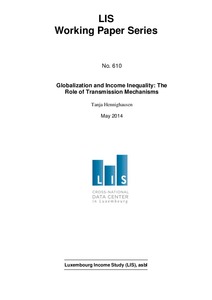Globalization and income inequality: the role of transmission mechanisms
"The openness to international trade and capital movements of industrialized countries has increased substantially during the recent decades. At the same time, most of these countries experienced a rise in income dispersion. Against this background, the paper analyzes empirically whether the ob...
| Main Author: | |
|---|---|
| Institution: | ETUI-European Trade Union Institute |
| Format: | TEXT |
| Language: | English |
| Published: |
Luxembourg
2014
LIS |
| Subjects: | |
| Online Access: | https://www.labourline.org/KENTIKA-19117307124919355899-Globalization-and-income-inequ.htm |
| Summary: | "The openness to international trade and capital movements of industrialized countries has increased substantially during the recent decades. At the same time, most of these countries experienced a rise in income dispersion. Against this background, the paper analyzes empirically whether the observable changes in income distribution can be explained by the greater global integration of advanced economies. The analysis thereby focuses on the role of several transmission channels through which globalization should influence the personal distribution of market and disposable incomes as well as redistribution. I employ panel data covering 28 OECD countries between 1960 and 2010 to analyze the impact of globalization on a set of labor market outcomes (transmission channels) and to test how these translate into a greater (or smaller) income inequality. Overall, the empirical findings do not indicate that international trade and capital mobility raise income differences in industrialized countries. Rather, the globalization-induced rise in income dispersion through greater factor price differences is mitigated by a reduction in unemployment." |
|---|---|
| Physical Description: | 43 p. Digital |

